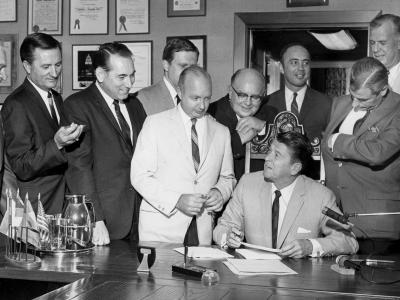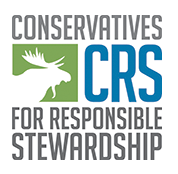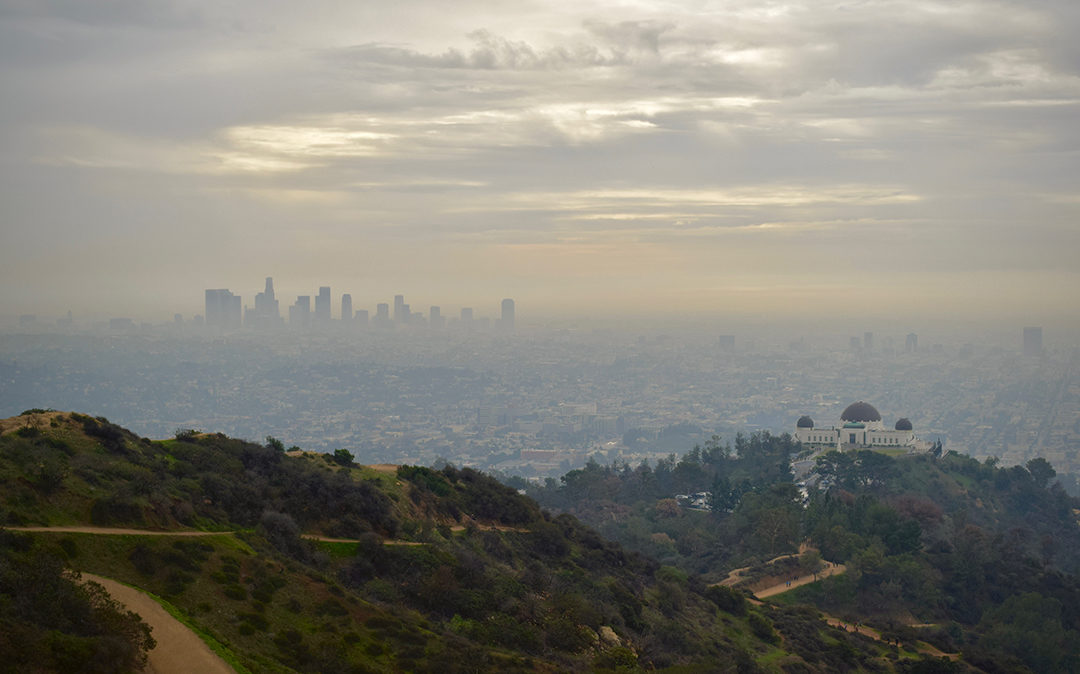The Trump administration’s recent move to revoke California’s ability to set tougher emissions standards for cars sold in the state is not aimed at rolling back Obama policy, it seeks to reverse a waiver that then governor Ronald Reagan secured for the state more than 50 years ago.
Governor Reagan was very committed to cleaning up California’s notorious smog problem, which was largely due to auto emissions. Not only did he support stronger pollution limits, in 1967 he established the California Air Resources Board (CARB) and appointed a scientist—an expert on smog—to lead the agency.
That same year, Congress was considering the Air Quality Act of 1967. Reagan wanted assurance that any new federal law would not threaten California’s strong tailpipe pollution standards. He worked with his allies in the California congressional delegation to secure a waiver that allowed the state to set its own, more stringent, pollution limits.
Shortly thereafter, Reagan signed a state bill into law curbing auto emissions significantly more than was required by the new federal standards.
Reagan was very proud of his smog-fighting efforts, and as president, he made them the topic of a 1984 radio address to the nation. Listen Here:
This Trump administration move to strip California of its longstanding waiver not only threatens more smog, it represents a strike against states’ rights, and it tramples on Reagan’s legacy by seeking to eliminate one of his signature achievements.
Revoking the waiver is part of a broader administration rollback of automobile fuel economy standards that is so illogical even auto manufacturers, including Ford, General Motors, Honda, and Toyota, are opposed. They argue that the rollback invites litigation and regulatory uncertainty, stalls long-term industry planning, and risks American global competitiveness.
Oil giant Royal Dutch Shell also formally opposes the Trump rollbacks.
The existing corporate average fuel economy (CAFÉ) standards, which were part of a landmark 2012 agreement between the auto industry and the previous administration, were set to increase to 54.5 mpg by 2025. The Trump administration rollback would freeze the standard at 37 mpg.
This is all predicated on very dated information and myths about CAFÉ standards. There are no safety concerns with modern fuel-efficient vehicles, and from a cost perspective, fuel-efficient models exists at many price points. According to Consumer Reports, scrapping the 2025 standards will cost U.S. drivers about $460 billion dollars in lost fuel savings.
Today’s advances in technology (hybrid, electric, plug-in hybrid, advanced diesel, fuel cell, etc.) already allow many of today’s 2019/20 car models to exceed that 37 mpg standard. Some 2018/19 models already exceed the 54 mpg target for 2025.
Revoking the California waiver would prevent that state, and the 13 others that follow its lead, from setting emission standards that help drive higher automobile fuel economy.

Reagan signing bill establishing California Air Resources Board
Crazier yet, when BMW, Ford, Honda, and Volkswagen struck an agreement with California to voluntarily meet the state’s emissions standards, the Trump administration’s Department of Justice launched an antitrust investigation.
Seriously, now automakers are not allowed to voluntarily manufacture cleaner cars? What ever happened to free enterprise?
While Ronald Reagan was quick to rail against bureaucratic red tape and unnecessary regulation, he was also quick to recognize and pursue policies that make both environmental and economic sense, policies that leverage America’s entrepreneurial prowess for the common good.
The current administration’s backwards moves on auto efficiency are not even remotely conservative, as they ignore market trends and corporate investments, stifle innovation, and act contrary to the interests of future generations.
And by reversing Reagan’s very successful smog fighting policies, they also dishonor the legacy of one of our greatest conservative leaders.


